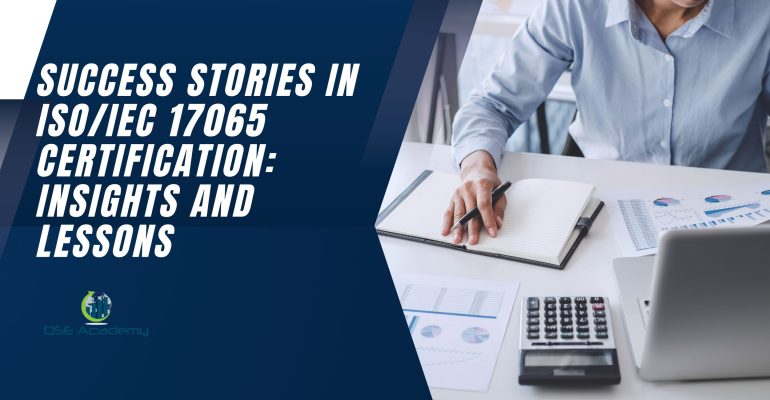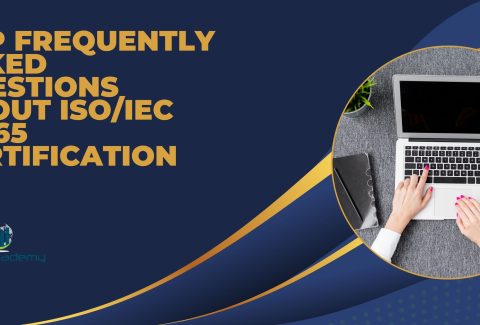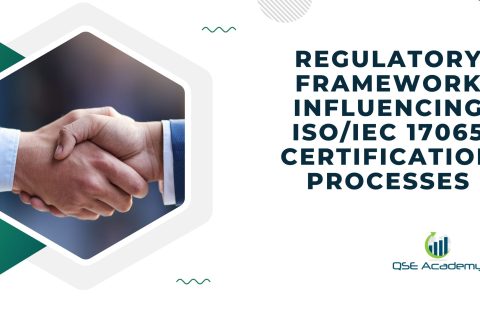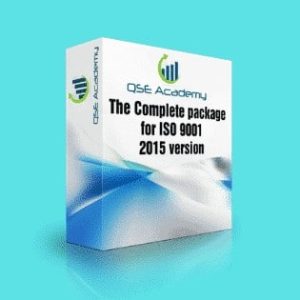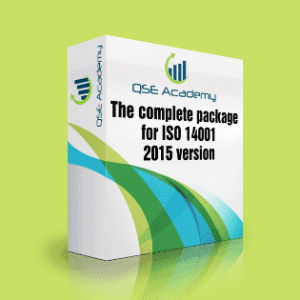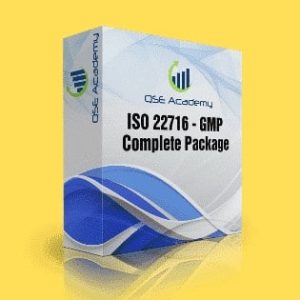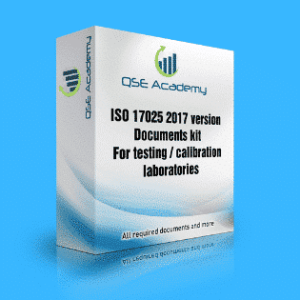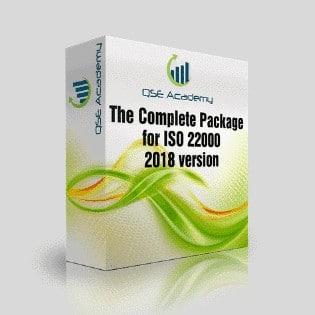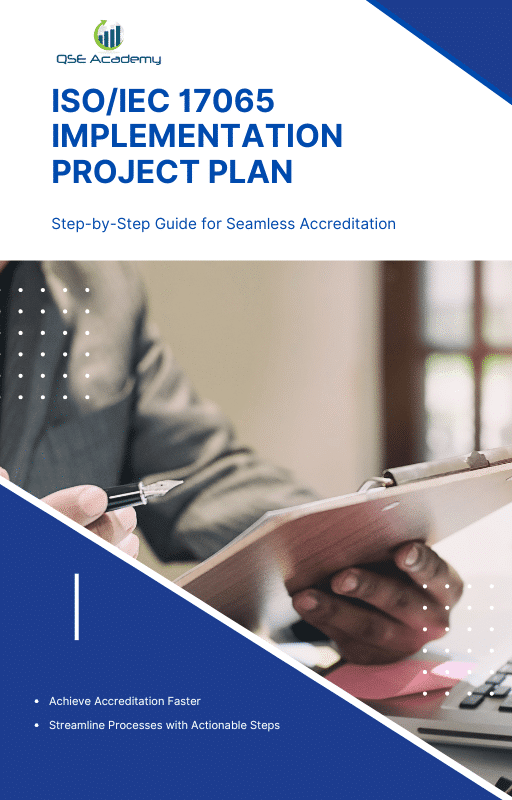Success Stories in ISO/IEC 17065 Certification: Insights and Lessons
In a marketplace where trust is currency, ISO/IEC 17065 certification stands as a bastion of credibility. This international standard is a testament to an organization’s commitment to quality and reliability in product certification. Delve into the inspiring journeys of diverse sectors, overcoming challenges to achieve this gold standard of consumer assurance.
Introduktion
ISO/IEC 17065 is an international standard that sets requirements for bodies certifying products, processes, and services. Its significance lies in providing a benchmark for certification bodies to operate in a competent, consistent, and impartial manner. The successful certification under ISO/IEC 17065 demonstrates an organization’s commitment to upholding high standards and can offer competitive advantages such as enhanced market access and customer trust.
This standard’s predecessors trace back to the broader field of conformity assessment and quality management systems, evolving to specifically address the certification of products, processes, and services. Over the years, ISO/IEC 17065 has become integral to ensuring that certification bodies meet not only the technical competence necessary but also maintain neutrality in their certification process.
Organizations that achieve ISO/IEC 17065 accreditation benefit in their ability to meet regulatory requirements and demonstrate to regulatory authorities and the market that they are reliable entities for certifying products and services under the relevant standards.
| Key Focus of ISO/IEC 17065 | Significance for Certification Bodies |
| Impartiality and Consistency | Enhances credibility and trust. |
| Teknisk kompetens | Ensures quality and reliability. |
| Operate a Quality Management System | Drives operational efficiency. |
| Meet Regulatory and Legal Requirements | Facilitates compliance and market entry. |
In conclusion, ISO/IEC 17065 serves as a crucial scaffold for certification bodies around the world, ensuring that their certification processes are thorough, impartial, and in line with the highest international standards.
Förståelse av ISO/IEC 17065
ISO/IEC 17065 is an international standard that outlines requirements for bodies certifying products, processes, and services. It aims to ensure that certification bodies operate in an impartial, consistent, and reliable manner, thus underpinning quality and safety while boosting consumer trust and facilitating market access.
The key objectives of ISO/IEC 17065 include:
- Ensuring Quality and Safety: By setting benchmarks for certification practices, it helps in maintaining high levels of quality and safety in various domains.
- Promoting Consistency: This standard ensures that all Certification Bodies adhere to the same rigorous processes, guaranteeing consistent certification outcomes.
- Enhancing Trust and Confidence: Equipped with ISO/IEC 17065 certification, businesses signal to the market their commitment to excellence, thereby increasing consumer and stakeholder confidence.
The standard encompasses various aspects of certification:
- Allmänna krav: Covering legal, contractual, and issues of impartiality.
- Strukturella krav: Pertaining to the organizational structure and the management of a Certification Body.
- Krav på resurser: Focusing on the competence of personnel and the adequacy of the infrastructure.
- Krav på processen: Detailing the certification, surveillance, and recertification processes.
- Krav på ledningssystem: Including stipulations for internal audits, management reviews, and control of documents.
Meeting these diverse requirements ensures that certification bodies can provide services that consistently meet both customer demands and applicable regulatory requirements.
Case Study 1 – Manufacturing Industry
Background: XYZ Manufacturing Co. is a leading company specializing in the production of medical devices. Initially, achieving ISO/IEC 17065 certification posed challenges, with gaps in their processes to meet the requirements for certification bodies, particularly in their quality management systems and documentation practices.
Implementeringsprocess: To bridge these gaps, XYZ Manufacturing Co. conducted a thorough gap analysis, which helped them identify areas needing improvement. They then developed and implemented new procedures that aligned with relevant standards and regulatory requirements for product certification. Recognized Accreditation Bodies provided guidance through the accreditation process. Staff underwent extensive training to ensure they were competent and could perform conformity assessment procedures effectively.
Results and Impact: Upon achieving ISO/IEC 17065 certification, XYZ Manufacturing Co. saw marked improvements in product quality and customer satisfaction. Moreover, the certification facilitated greater market access, providing a noticeable competitive advantage. Financially, the company benefited from more streamlined operations and risk management, resulting in operational cost savings.
Lessors Learned: Key takeaways included the critical nature of top management’s commitment, the role of effective communication and training, and the necessity of continuous improvement driven by regular internal audits to maintain the scope of certification and accreditation programs.
Case Study 2 – Service-Based Industry
Översikt:
- Company: A mid-sized IT services provider
- Services: Specializes in cloud computing and cybersecurity solutions
- Utmaningar: The lack of a systematic approach in service delivery and inconsistencies in meeting industry benchmarks
- Målsättning: To enhance credibility and meet regulatory requirements for market access
Implementeringsprocess:
The company undertook a comprehensive gap analysis to identify areas that required alignment with ISO/IEC 17065 requirements. It followed by revising existing protocols and formulating robust procedures that complement the conformity assessment standards. Extensive staff training programs were conducted to ensure that the team understood and could implement new quality-centric processes effectively.
Results and Impact:
Post achieving ISO/IEC 17065 certification, the IT service provider reported a marked increase in service efficiency and a boost in customer satisfaction metrics. This milestone also enhanced the company’s reputation significantly, resulting in a competitive advantage in the market. Additionally, it saw financial gains from operational optimizations and established trust with regulatory authorities as a certified conformity assessment body.
Lessons Learned: The journey underscored the relevance of engaging stakeholders and maintaining a dynamic strategy to incorporate feedback and continuous improvements. The service provider recognized the pivotal role of technology in streamlining certification-related procedures, leading to an enduring commitment to flexibility and adaptability in its operations and services.
Case Study 3 – Agricultural Sector
Background Overview
A prominent entity within the agricultural industry, renowned for its extensive range of organic products, faced the challenge of benchmarking its offerings against international standards. Their objective was to enhance market access by certifying products in accordance to the requirements for certification bodies outlined in ISO/IEC 17065.
Initial Challenges
The initial hurdles included aligning internal audits with relevant standards, comprehending the certification scope, and meeting regulatory requirements across different jurisdictions. The translation of a robust quality management systems into practical conformity assessment procedures was essential but proved initially daunting.
Implementation Process
The process began with a thorough gap analysis, followed by the development of applicable standards-compliant procedures. Extensive training ensured staff competence, with a focus on maintaining operational consistency and adherence to a predefined certification scheme.
Results and Impact
Post-implementation, the agricultural firm achieved ISO/IEC 17065 certification, recognizing its processes and products as meeting international quality benchmarks. This led to increased customer satisfaction, with significant financial and operational benefits allowing for broader market access and competitive advantages.
Lessons Learned
Documenting every step of the accreditation process highlighted the importance of systematic record-keeping. Continuous monitoring and a committed culture of compliance emerged as key factors in maintaining certification standards.
Best Practices for ISO/IEC 17065 Certification
Achieving ISO/IEC 17065 certification as a conformity assessment body involves several best practices that ensure the process’s success. Here’s what to consider:
- Develop a Comprehensive Plan: Outline a detailed project plan, delineating each step necessary for the certification process. This should cover understanding the ISO/IEC 17065 requirements, developing necessary documentation, and mapping out the path towards successful accreditation.
- Ensure Top Management Support: Certification success hinges on leadership commitment. Strategies that guarantee top management’s ongoing support include demonstrating the competitive advantages of certification and detailing how it aligns with the organization’s strategic goals.
- Utbildning och kompetensutveckling: Implementing effective training programs is crucial. The organization must ensure that staff are not only trained with relevant standards but also their competence is continuously monitored and evaluated.
- Continuous Improvement and Regular Audits: Instituting a culture of ongoing improvement is vital. Regular internal audits help maintain conformity with the certification requirements, and the findings from these audits provide invaluable insights for continuous performance enhancement.
To maintain the certification, an organization must continuously meet the stringent requirements for certification bodies set by regulatory authorities and accreditation bodies, ensuring their certification schemes remain internationally recognized and trusted.
The certification scope and applicable standards must be clearly defined, and the quality management systems should be aligned with legal and regulatory requirements. Adoption of conformity assessment procedures is key to a successful application for accreditation and maintaining the certification mark. Regularly updating the internal audits and ensuring compliance with the accreditation process contribute to meeting the market access demands and maintaining the certification.
Gemensamma utmaningar och lösningar
Challenge 1: Managing Impartiality and Conflicts of Interest
To uphold the integrity of the ISO/IEC 17065 certification, certification bodies (CBs) must ensure impartiality and manage conflicts of interest effectively. The strategy includes:
- Establishing policies that clearly define conflicts of interest.
- Implementing procedures to resolve such conflicts proactively.
- Training personnel to remain unbiased, emphasizing the importance of objective certification decisions.
Challenge 2: Maintaining Up-to-Date Documentation
Documentation control is a critical component that ensures the efficiency of the ISO/IEC 17065 certification process. It requires:
- Adoption of best practices for updating, reviewing, and archiving documents.
- Ensuring documentation reflects the latest regulatory requirements and applicable standards.
- Regular internal audits to verify document accuracy and relevance.
Challenge 3: Ensuring Consistent and Fair Certification Decisions
Consistency in certification decisions is essential for CBs to maintain credibility and trust. This involves:
- Developing and applying standardized criteria for all certification processes.
- Providing comprehensive training for staff on the nuances of the certification schemes and requirements.
- Regular review of decision-making criteria to align with evolving standards and market expectations.
Slutsats
The journey to ISO/IEC 17065 accreditation is more than a strategic goal; it’s a commitment to excellence and a significant competitive edge. Success stories across international markets demonstrate that Certification Bodies (CBs) adhering to this international standard for conforming assessment bodies not only meet regulatory requirements but also gain improved market access and recognition. The certification process, often demanding and intricate, echoes the core value of credibility that ISO/IEC 17065 upholds.
Lessons learned from these success stories emphasize the importance of robust quality management systems, comprehensive internal audits, and adherence to relevant standards. These elements are crucial to maintaining the integrity of the certification schemes. The future outlook reveals a trend towards an increased demand for accredited CBs as industries and regulatory authorities recognize the value in certification marks underpinned by rigorous accreditation processes.
In short, adherence to ISO/IEC 17065 equips Certification Bodies with the authority and confidence to certify with valor, navigating through the competitive landscape of regulatory requirements and conformity assessment procedures, towards a future where quality assurance remains paramount.
Key Insights:
- Continuous Quality Improvement
- Market Recognition and Access
- Regulatory Compliance
- Adherence to Applicable Standards
Future Outlook:
- Growth in Demand for Accredited CBs
- Evolution of Certification Standards
Referenser
Authoritative Sources:
- Internationella standardiseringsorganisationen (ISO): The official ISO website provides comprehensive documentation and resources related to ISO/IEC 17065.
- Internationella ackrediteringsforumet (IAF): Responsible for overseeing the implementation and recognition of accreditation processes globally, the IAF offers guidance on the application of ISO/IEC 17065.
- Nationella ackrediteringsorgan: Examples include ANSI in the United States, UKAS in the United Kingdom, and DAkkS in Germany. These bodies provide national guidelines and resources relevant to ISO/IEC 17065 certification.
Relevanta branschstandarder och riktlinjer:
- ISO/IEC 17025: Often complementary to ISO/IEC 17065, it specifies requirements for the competence of testing and calibration laboratories.
- ISO/IEC 17000 series: Provides terms and definitions for conformity assessment, including the accreditation of certification bodies.
- ISO/IEC 17021: Sets out requirements for bodies providing audit and certification of management systems.
- ISO CASCO Toolbox: This collection of standards provides tools for the certification process, which includes ISO/IEC 17065.
Ytterligare läsning:
- “Guidance on the Application of ISO/IEC 17065”: A document that provides an in-depth look into the certification process for interested entities.
- “ISO/IEC 17065 for Certification Bodies – A Practical Guide”: Offers insights on how to meet the requirements for certification bodies.
Tillägg
For organizations aspiring to excel as certification bodies, achieving ISO/IEC 17065 accreditation is pivotal. This international standard specifies the requirements for bodies certifying products, processes, and services, ensuring they operate in a competent, consistent, and impartial manner. Below is a concise representation of resources, tools, and strategies instrumental in navigating the accreditation process and sustaining compliance:
- Mallar och checklistor: These are crucial for documenting procedures and conducting internal audits as per ISO/IEC 17065 requirements. They help in streamlining the certification process, ensuring that all relevant standards and regulatory requirements are met consistently.
- Utbildnings- och certifieringsprogram: These educational initiatives enhance the understanding of the ISO/IEC 17065 standard and accreditation process. They are vital for personnel involved in certification activities to stay updated with best practices and to understand the intricate requirements for certification bodies.
Resurser
- ISO/IEC 17065 compliance documents
- Accreditation process guidelines
- Internal audit checklists
Utbildning
- Online courses on ISO/IEC 17065
- Workshops by Accreditation Bodies
In conclusion, investing in the right tools and training can significantly ease the application for accreditation while assuring that certification schemes meet international benchmarks. This positions certification bodies for success, providing competitive advantages, market access, and adherence to applicable standards and legal requirements.
Letar du efter fler resurser om ISO 17065?
Om du tyckte att den här artikeln var till hjälp kan du utforska våra premiumresurser som är utformade för att hjälpa dig att uppnå ISO 17025-certifiering på ett effektivt sätt:
- 📦 Komplett dokumentationspaket för ISO/IEC 17065 2012: Få alla viktiga mallar och dokument du behöver för en snabb och enkel implementering.
- 🎓 Onlinekurs om ISO/IEC 17065 2012 : Delta i vår omfattande utbildning för att lära dig de viktigaste begreppen och de praktiska stegen mot certifiering.
- 📋 Checklista för ISO/IEC 17065 2012: Ladda ner vår detaljerade checklista för att säkerställa att du har täckt varje steg i processen.
Dessa resurser är skräddarsydda för att tillgodose dina behov och säkerställa en smidig certifieringsresa. Utforska dem redan idag och kom ett steg närmare framgång!

